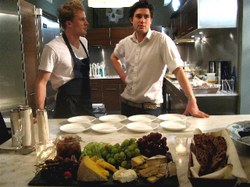Q & A with Silkstone

Separately, you two have made names for yourself in the event planning and culinary worlds, how did you decide to join together at Silkstone?
We’ve had a great friendship since when we were 13. We have lots of things in common- our passions in life. Being great friends, we’ve got similar views and similar tastes, not just in foods, but design as well. Also, we find that as friends, we’re challenged by that other person- we get so much better faster and we challenge each other creatively.
What was Silkstone’s first event like? Did everything go smoothly or was there a learning curve?
It was quite interesting- a dinner for friends of ours, and it was seven courses, all about sourcing from within 100 miles of
Do you have a favorite event you’ve put together so far?
There’s a lot of satisfaction in the job and we love doing things for small groups- parties for friends, and ones where we’re given faith and they let us run with it. We love working with new ingredients that people haven’t heard of- different fish, different vegetables…you have to get people to trust ingredients?
So what’s on menus at Silkstone events now?
We’re doing a lot of baby vegetables, ramps, peas and asparagus. For a Tribeca Film Festival event we did a pea puree- fresh, sweet, and simple.
Speaking of ramps, there’s been a lot of backlash lately- ramps seem to be getting a reputation as a trendy food. What are your thoughts on culinary trends, and are there any you dislike?
As for ramps, the fact is they’re a marker, a turning point. In the
You’ve both had mentors along the way- Phil, how did you end up in events and Ben, you as a chef?
Phil- My godfather in the
Ben- I got very sick, and the only way to cure myself was through diet- reversing the pH of my body. When I was at school in
What keeps you going when you’re working two events back to back nearly every day? What motivates you?
Food is the idea of bringing people together, having a really good time with food. It’s food starting conversation and that’s why we got into this- the fantastic memories of dinner, whether it be at home or a restaurant, the ones tha
t always stick out in our head… you’re sharing, talking, no matter where it is in the world. We want to create a place where you can feel like this.
We keep reading about local, sustainable, and organic food, but what questions should we be asking when we go out to eat?
To be brutally honest, it’s very hard for anyone claiming to be 100% local, sustainable, and organic. It’s easy to cheat- organic can be just a label, and there aren’t that many great organic wholesalers. It’s important to ask, “What’s growing around me?” That’s really important- a great question to ask a chef is, “what’s new, what’s just come in?” People need to realize that behind everything there’s a story- certainly wine, and now food getting more and more attention. We have to celebrate the labor that goes into it- the hours of love put into it- a carrot tastes so amazing when it’s produced with integrity, just like a champagne. We have to recognize farmers who go that extra mile.
For someone who entertains a lot at home, what are some tips to follow your philosophy?
Be adventurous. Shop at greenmarkets, use Heritage Foods online, and talk to chefs about what’s local and what’s good now. Plan menus with stuff you haven’t had- different cuts of meat, for example. We’ve been to the fish market in the
Now that Silkstone’s taken off and you’re constantly booking events, what’s next? Perhaps a restaurant of your own?
We’ve got a lot of ideas, a lot of plans. There’s going to be a space to house our ideas and we think it’s a very exciting time to do what we’re doing. Opening our restaurant is the most important thing- we’re creating a space to encompass our philosophy- great work with suppliers, a tremendous team of young chefs- it’s going to be very exciting. It’s a happy marriage between our design ideas and our food and service. We’re looking at a not-too-far off time frame.
Silkstone Bespoke Events
www.silkstoneevents.com/index.html
(212) 229-1971








